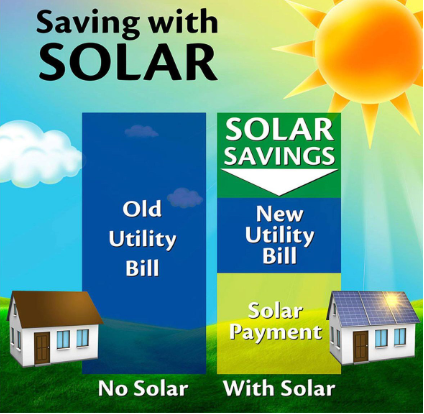How GOING SOLAR benefits the environment and PUBLIC health
Most people are aware of solar power, and its status in the "green energy" category. But, they don't know about the specific benefits to public health and the nature that solar power brings. These benefits are much greater than you might imagine.
What is the impact of solar power to reduce greenhouse emissions? What does this mean for the water supply and the ground? How does solar energy improve your health and that of your neighbors?
These questions will help you find alternative energy sources which can benefit you, your community as well as the natural environment. Here is your quick guide.
CARBON DIIOXIDE EMITIONS
Carbon dioxide from the atmosphere has an enormous influence on climate change. It gets absorbed by the atmosphere, stays there for decades after which it radiates heat towards the earth, warming the planet continually.
The climate change is a major cause of negative impacts on the health of the public. It allows for diseases that are infectious to spread, increases the frequency of famines and droughts, and worsens natural disasters. The risk of these threats can be mitigated by switching to solar power.
The generation of electricity by solar panels helps to reduce air pollution as they do not rely on fuel that emits carbon dioxide in order to run.
Renewable energy sources will eventually replace fossil fuels that are not renewable that release carbon dioxide. This will stop the use of petroleum as well as coal that release heavy greenhouse gases into our atmosphere.
METHANE EMISSIONS
Many people are aware of carbon dioxide and its relation to climate change. Fewer people know about methane.
Methane has a longer time in the air than carbon dioxide. It also holds more heat and radiation. Methane's impact is 25 times greater than carbon dioxide in pound-for-pound.
The combustion of petroleum and natural gas produces huge quantities of methane into our atmosphere. Methane is not required to transmit solar energy sources or use. Therefore, the more solar energy you use, the less natural gasoline and petroleum you'll use and the less methane you release.
GROUND POLLUTION
Ground is damaged by non-renewable energy sources in many ways. Oil can spill into soil, causing harm to plants and animals; and fracking for natural gas damages habitats and a number of layers of earth.
Nuclear power doesn't affect carbon dioxide levels within the atmosphere, however the radioactive substances used in nuclear power plants can pollute the ground. They could make certain areas inhospitable or lead to radiation poisoning.
Solar panels aren't significant in the cause of ground pollution. Rain that runs off solar panels won't draw their material into the earth.
Yes, solar panels contain lead and other elements that could pose a risk. Solar panels have a 25-year average lifespan, so the chance of their being damaged is extremely low. The panels are recyclable if they become damaged.
A solar panel set up over your yard will block sunlight and prevent water from getting to the grass below. Make sure you place your panels in a place that won't hinder the growth of your plants. You can give your plants some extra water if they are growing under the panels.
AIR POLLUTION
According to the World Health Organization, 4.2 million people are prematurely killed every year due to outdoor air pollution. The burning of oil that is the primary source of pollution, has a variety of dangerous chemicals that can cause cancer.
Because coal is rich in chemicals such as sulfur dioxide, it could cause lung damage if inhaled. If they are absorbed into the bloodstream, the coal particles can cause damage to your organs.
Eyes can also be affected by air pollution. They could cause damage to your vision, both short-term as long-term. However, solar panels do not affect the air in any way. The substances they contain aren't released into the air even in extreme cases if there's a fire.
TRANSMISSION and STORAGE
Urban planners are trying to put power plants close to residential areas, but those that are close are usually further away from homes.
This means that planners string up long transmission lines to transfer electricity throughout the town. However, some electricity is lost in the transmission process, which requires the power plant to burn more fuel in order to compensate for the electricity that was lost.
Solar installations Scottsdale systems do not require transmission lines and are able to generate the power you require.
It is possible to transfer any excess generated energy to batteries and keep it in reserve for power failure situations. You can also tap into batteries' power stored in the night when your solar panels aren't operating. This will let you reduce the use of fossil fuels and decrease your carbon footprint.
WATER UTILISATION
Another source of renewable energy is hydropower. It doesn't pollute or emit carbon dioxide. It's dependent on rivers and other natural water bodies, which can harm ecosystems and hinder the flow of water to people.
Solar panels don't affect water usage in any way. Your panels might not require water to keep clean since rain is able to remove dust, dirt and other particles.
best solar companies in Nevada
solar las cruces
solar santa fe
solar sparks
electric company in chandler az
Advosy Energy
4411 S 40th St Suite D-5 Phoenix, AZ 8540
602-584-8294

